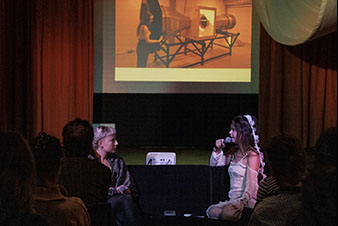MENU

photos: Emma Spannenberg
The critique of the labourer trough the subodination of the artist as a machine
a recap of the artist talk with Kitty Maria (SEP 20, 2024)
by Vanesa Miteva
Oct 1, 2024
During the seventh studium resort, we conversed with Kitty Maria,
An artist whose documented performances and installations thematically focus on the automated performance and the new labourer in a Post-Fordist society.
Kitty’s work draws parallels between the key notion of a performance in art historian terms and performance in industrial terms:
performance /pəˈfɔːməns/
1. an act of presenting a play, concert, or other form of entertainment.
>>>>>
2. the action or process of performing a task or function.
Through this comparison,
symbolically,
the distinction between humans and machines as labourers disappears; they become the same thing:
The human is a machine, and the machine is a human; the machine is treated with intimacy, care and sympathy; and the human is treated with rigidity, control and automation.
Where is the distinction anyways?
>>>>>>In her piece A Static Load Test for Seat and Backrest (2020), Kitty has placed herself in a machine, whose purpose is to test the functionality of chairs. The machine has two plexiglass plates that, through automated movement, push on the sеаt and the backrest of the chair that is being tested. The machine works while the humans are working, hence the human is subordinated to it. Furthermore, in her video work Scene with Female Wrestlers (2021), Kitty documents her stay in Gdańsk Saw Mill, where the human workers seem to be the automated machines cutting the trees. This automation is challenged by the ambiguity that Kitty’s performance creates.
Not only in blue-collar jobs but also in higher corporate environments, the human-labourer can be treated as a machine. The corporate labourer is expected to be professional, rational, stoic and objective. To be human is to be emotionally complex, irrational and biased. Thus, the qualities that make us who we are, apart from our functionality, are not given value at highly industrial or professional work spaces. The labourer is ideally a machine merely utilised for production of goods. In their project Hosting Air Kitty and Elise Ehry, challenge the notion of functionality
through series of performances that offer
non-services, (in translation: unneeded services)
functionality /ˌfəNG(k)SHəˈnalədē/
>>>>>>>>>>> refers to the capacity of something (a product, system, or process) to
perform its intended purpose or task. It often describes how well an object or system
operates to fulfil its design or the range of operations or tasks it can perform.
The concept of functionality is central to Kitty’s work. In her residency with Het Resort (2020), Kitty engages with a windtunnel set up for calibrating wind sensors. The paradigm mentioned earlier:
human<<<<<<<>>>>>>>> machine
is explored even further.
She treats the wind tunnel as a fellow human being,
with gentleness and empathy
Touching the object as if touching another person,
with mindfulness of the full being of oneself,
with sympathy towards one’s value, beyond industrial purpose and productivity
Ultimately, Kitty Maria’s performances offer a simulation for embodied experience
- the opportunity for a machine to feel human, and for a human to feel like an object -
which consolidates her critique of the contemporary labourer. Through her interventions, Kitty mysticises the industrial work environment, as an outsider who sees the absurdity of these almost foreign worlds of production. She creates meaning out of the ambiguity she creates for the labourers that have been subordinated to these environments, thus inflicting a sort of playful awareness to all of us who sometimes can get stuck in the routine of the rat race.
about
Vanesa Miteva (1999, Bulgaria), graduated Bachelor in Arts, Culture and Media (University of Groningen, 2022).
Kitty Maria's work consists of video performances and installations, as an ongoing investigation of the automated production site and the new labourer. In the work, she often forges friendships with companies or shops to make an intervention in places of labour or to subject herself to the production process.
Kitty lives and works in Amsterdam, received her Bachelor at Artez (Arnhem, NL) and her Master at Sandberg Institute (Amsterdam, NL). She is founder and member of the artist collective Soft Landings. She has received an Emerging Talent Grant from the Mondriaan Fonds in 2019 and is currently receiving financial support from the Prins Bernhard Cultuurfonds and the Mondriaan Fonds.
Kitty was part of resort’s ‘S03E01: Little Nostrum’ / an exhibition at former gay sauna ‘t Pakhuisje in 2020 w/ Tom K. Kemp and Alicja Nowicz.
studium resort is made possible by Pictoright Fund